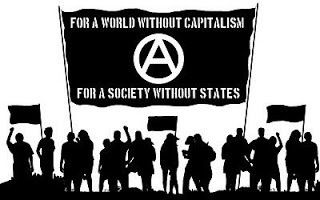It should be obvious to any observer of the present economic system that rules this world, that it can't be reformed. Capitalism can't be converted into a caring compassionate, system that sees to the needs of all our people. Its basis is self gain based on the exploitation of others, others are there to be profited from, not cared for. So running to a ballot box putting down your mark, against a chosen party disciple, will not bring about the compassionate capitalism you hope for, nor will petitioning the political ballerinas that hold the reins of power because of that ballot paper.
The creation of that better world for all, must take place outside the rules of capitalism, and outside the legislation of the capitalist minders, the state. The change has to happen among the people, by the people, in their communities and workplaces, in spite of, and in opposition to, the structures created by this enslaving economic system. We have no rules, we create structures and strategies as we develop, our needs will determine the shape of our new society, after we have built a bonfire of all the rules and legislations that bind us as units of profit, and as subservient units of the state.

In the New York Times, Niki Kitsantonis writes,
“It may seem paradoxical, but Greece’s
anarchists are organizing like never before.”
No. Anarchists – the sensible ones, at least – are not against
organization. They are against rule – against ruling and
against being ruled. Merriam-Webster explains
the derivation of the word: “Medieval Latin anarchia,
from Greek, from anarchos having no ruler,
from an- + archos ruler.”
True, as the dictionary editors note, “anarchy” and
“anarchism” are sometimes used to mean something like “absence
or denial of any authority or established order” or simply “absence
of order.” But rational political theorists and even activists
don’t advocate pure disorder; they advocate the absence of rule,
which they define as the absence
of government.
So what is it that these Greek anarchists are organizing for?
Well, in fact, the focus of the article is on how anarchists are
supplying the services that the Greek state is not providing:
Seven years of austerity policies and a more recent refugee crisis
have left the government with fewer and fewer resources, offering
citizens less and less. Many have lost faith. Some who never had
faith in the first place are taking matters into their own hands, to
the chagrin of the authorities….
Whatever the means, since 2008
scores of “self-managing social centers” have mushroomed across
Greece, financed by private donations and the proceeds from regularly
scheduled concerts, exhibitions and on-site bars, most of which are
open to the public. There are now around 250 nationwide.
Some activists have focused on food and medicine handouts as
poverty has deepened and public services have collapsed.
In recent months, anarchists and leftist groups have trained
special energy on housing refugees who flooded into Greece in 2015
and who have been bottled up in the country since the European Union
and Balkan nations tightened their borders. Some 3,000 of these
refugees now live in 15 abandoned buildings that have been taken over
by anarchists in the capital.
One part of Athens seems to have been a self-governing, but not
state-governed, territory for some time. Some
sources say Exarchia has existed since as early as 1870. The name
presumably comes from “ex-,” out of, away from, and of course
“archos,” ruler.
In Athens, the anarchists’
epicenter remains the bohemian neighborhood of Exarchia, where the
killing of a teenager by a police officer in 2008 set off two weeks
of rioting, helped reinvigorate the movement and produced several
guerrilla groups that led to a revival of domestic
terrorism in Greece.
The police and the authorities
tread lightly in the area.
The police have recently raided some buildings illegally occupied
by anarchists, called squats, in Athens, in the northern city of
Thessaloniki and on the island of Lesbos, a gateway for hundreds of
thousands of migrants over the past two years….
In Exarchia, one of the squats
includes a former state secondary school that was abandoned because
of structural problems. Established last spring with the help of
anarchists, the squat is now home to some 250 refugees, mostly from
Syria, who have set up a chicken coop on the roof. Many more refugees
are on a “waiting list” for other occupied buildings.
The squats function as
self-organized communities, independent from the state and
nongovernmental organizations, said Lauren Lapidge, 28, a British
social activist who came to Greece in 2015 at the peak of the refugee
crisis and is actively involved with several occupied buildings.
“They are living organisms:
Kids go to school, some were born in the squat, we’ve had weddings
inside,” she said.
There’s really nothing paradoxical about anarchists setting up
institutions and communities outside the state to provide needed
goods and services. The Greek anarchists probably don’t see
businesses as part of that non-state society, though libertarian
anarchists and anarcho-capitalists do.
What is paradoxical, as I
wrote five years ago, is Greek “anarchists” who object
to the state reducing its size, scope, and power by cutting back on
taxes and transfer payments. Anarchists who organize voluntarily to
achieve common purposes are just living their philosophy.

Visit ann arky's home at
www.radicalglasgow.me.uk




















































